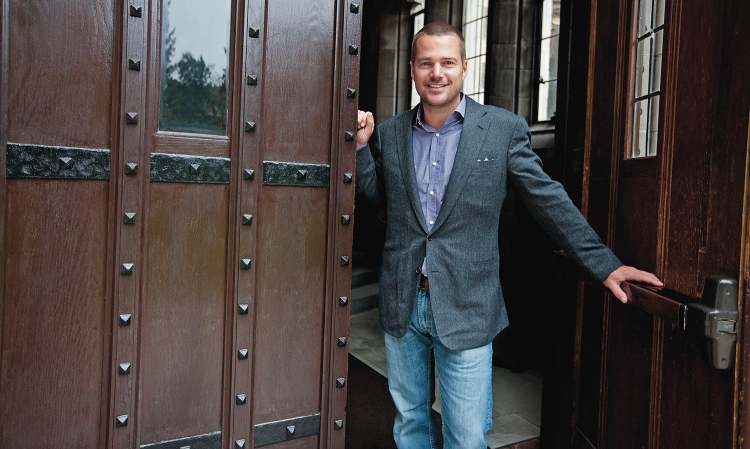
By
Boston College’s Sesquicentennial celebration continues March 21-23, with a slate of events that epitomize the University’s longstanding commitment to exploring critical social issues, and its passion for the performing arts.
On March 21 and 22, BC will host the academic symposium “Migration: Past, Present and Future,” that will examine historical and enduring issues in migration, including refugees and forced migration, race and class in US immigration, and policy. Sponsored by the University’s Center for Human Rights and International Justice, the conference will be highlighted by a daylong series of panel discussions on March 22 with eminent scholars, authors and commentators.
“Migration: Past, President and Future” is free and open to the public, but registration is required by tomorrow, March 15. Online registration is available here; for questions, email 150@bc.edu or call ext.2-3292.
Then, on Saturday, March 23, the University Chorale, Boston College Symphony Orchestra, BC bOp! and the University Wind Ensemble will present a Sesquicentennial concert at 2 p.m. in Boston’s famous Symphony Hall, featuring a performance of Aaron Copland’s “A Lincoln Portrait” with actor Chris O’Donnell ’92 narrating.
Adding to the festivities — and as a complement to “Migration: Past, Present and Future” — the Graduate School of Social Work will host a naturalization ceremony for 100 immigrants (including a BC freshman) living in Massachusetts at 3 p.m. in Robsham Theater, prior to the symposium kick-off on March 21.
Center for Human Rights and International Justice Director David Hollenbach, SJ, who will give the introduction for the symposium, said the event is a highly appropriate commemoration of Boston College’s heritage.
“BC has a strong historical link with the reality of migration, given that many of its earliest students came from Irish immigrant families,” said Fr. Hollenbach, the University Professor in Human Rights and International Justice. “Today, migration is one of the strongest social forces shaping our world. Over 200 million people are living outside the countries of their birth, some forced from home as refugees, some seeking to escape desperate poverty, some seeking better lives for themselves.
“So while BC remembers its past and shapes educational programs that look to the future, it is surely fitting that we reflect on the reality of migration as we celebrate the University’s Sesquicentennial.”
The center’s associate director, Law Professor Daniel Kanstroom, added, “Migration is a deeply significant and particularly resonant topic for us to consider as part of the Sesquicentennial celebration of Boston College. It clearly relates to the specific demographic history of the University as well as to its religious and ethical foundations, and also exemplifies our continuing commitments to rigorous academic inquiry, to diversity, and to the pursuit of social justice.”
Opening the conference at 7 p.m. in Robsham will be a keynote address, “The Border Is Not a Straight Line,” by Peabody Award-winning author and essayist Richard Rodriguez, who wrote an autobiographical trilogy on class, ethnicity and race: Hunger of Memory, Days of Obligation: An Argument With My Mexican Father and Brown: The Last Discovery of America.
The symposium resumes the next day at 9 a.m. in the Heights Room of Corcoran Commons with the first of three panels, “Forced Migration: Refugees and Economic Migrants.” Panelists will be BC Law Dean Vincent Rougeau, who will give the introduction and serve as respondent; Jesuit Conference of Asia Pacific President Mark Raper, SJ; and University of California Hastings College of the Law Professor Karen Musalo, director of the Center for Gender & Refugee Studies.
“Race and Class in US Immigration,” which begins at 11 a.m., will be chaired and moderated by Lynch School of Education Professor M. Brinton Lykes, associate director of the Center for Human Rights and International Justice. The speakers are: Columbia Professor of History Mae Ngai, who is Lung Family Professor of Asian American Studies; Michael Olivas, Bates Distinguished Chair in Law at Houston University; and Harvard University Winthrop Research Professor of History Stephen Thernstrom.
A luncheon keynote, “Boston College and the Immigrant Experience: The First 150 Years,” will be presented by Clough Millennium Professor of History James O’Toole, who will be introduced by History Professor Kevin Kenny.
The final panel, “Future of Migration Policy in the US,” which will be introduced by Professor of Political Science Peter Skerry and moderated by “PBS NewsHour” senior correspondent Ray Suarez, consists of: Washington, DC, Archbishop Emeritus Cardinal Theodore McCarrick; Yale Law School Simeon Baldwin Professor Emeritus Peter Schuck; David Martin, Warner-Booker Distinguished Professor of International Law at University of Virginia; and Center for Migration Studies Executive Director Donald Kerwin Jr.
Biographies of the symposium speakers are available at http://bit.ly/Wm99nO.
Ticket information and reservations for the March 23 Sesquicentennial concert are available online at http://www.bso.org/Performance/Detail/50201. In addition to “A Lincoln Portrait,” the Chorale and Symphony will perform the first movement of Beethoven’s Fifth Symphony (by the Symphony only), Camille Saint-Saen’s “Tollite Hostias” and the “Hallelujah Chorus.”
The University Wind Ensemble will present an all-Leonard Bernstein program, including “Symphonic Dances from ‘West Side Story’” and “Slava!” The set by BC bOp! will feature Hank Levy’s “Decoupage,” Don Menza’s “Groovin’ Hard” as well as vocal renditions of “Moonglow,” “Perdido” and “That Cat Is High.”
[To read a Chronicle story about the Sesquicentennial concert, go to http://bit.ly/VTkdGC]
For news and features about the Boston College Sesquicentennial, see www.bc.edu/150.



